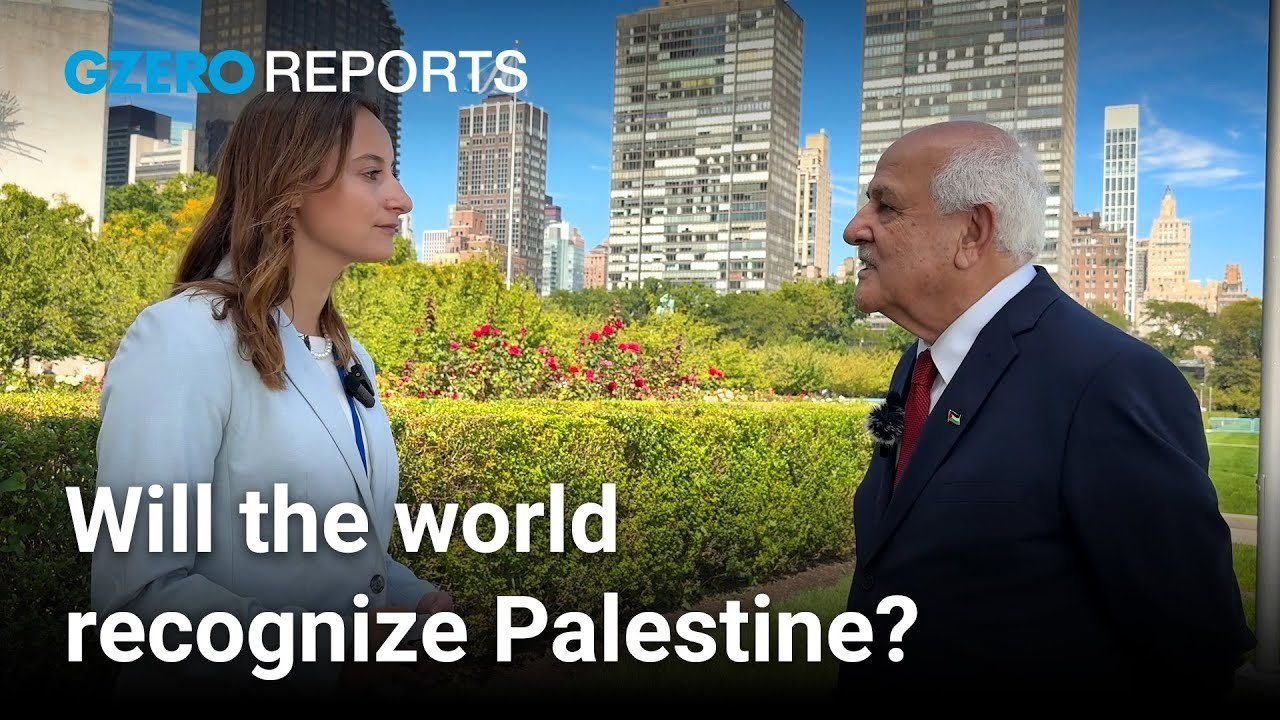GZERO Reports
Major western countries are going to recognize Palestine for the first time. Here’s why it matters.

- YouTube

As leaders from around the world arrive in New York for this year's United Nations General Assembly, one of the thorniest global issues hangs over the proceedings.
“Palestine is going to be the elephant in the room,” said Palestinian ambassador to the UN Riyad Mansour during an interview with GZERO this week in New York.
That’s because in the coming days several major Western powers are set to recognize Palestinian statehood for the first time. France, the United Kingdom, Canada, Australia, Belgium, Luxembourg, and Malta will all take this step.
What does it mean to recognize Palestinian statehood? Palestine exists in a paradox: it enjoys international recognition from nearly 150 countries, which allows it to field Olympic teams, maintain diplomatic missions abroad, and participate –partially, as an observer state – at the UN. Yet it lacks agreed upon borders, an army or capital, or full sovereignty under Israel’s ongoing occupation. France, in its announcement of its intention to recognize Palestine, said it was doing so to “reaffirm the Palestinian people’s right to self-determination.” It also stressed that it was recognizing Palestinian Authority (PA), which is based in the West Bank, rather than Hamas, which rules Gaza, as having sovereignty over all of the Palestinian territories, because the PA “has come out strongly in favor of the two-State solution and peace.”
Why are they recognizing Palestine now? All of these countries have historically showed strong support for Israel, and none of them voted in favor of Palestine’s UN observer status more than a decade ago. But the scenes of starvation in Gaza and mounting anger over the ferocity of Israel's prolonged military campaign in response to the Oct. 7th attacks, have shifted public opinion in many of these countries. In the UK, polling has showed increasing sympathy for Palestine over Israel, rising from 15% following the Oct. 7 attacks to 37% as of July of 2025. Meanwhile, support for Israel has fallen to 15%, with 51% of Britons saying that its actions are unjustified.
“Millions of people in these nations are pressuring their governments to do more in order to stop the genocide,” says Mansour, “to recognize the legitimate national rights of the Palestinian people to self determination, to statehood and the right of the refugees.”
Israeli Prime Minister Benjamin Netanyahu, however, has said recognizing a Palestinian state "rewards Hamas's monstrous terrorism and punishes its victims." The US ambassador to Israel Mike Huckabee said that "what destroyed the negotiations for the hostages was the European nations going and having this push for a unilateral recognition of a Palestinian state... it destroyed negotiations."
The US, consequently, has denied visas for over 80 Palestinian representatives, including Palestinian Authority President Mahmoud Abbas. The White House says Palestinian officials have undermined Gaza negotiations by appealing to international criminal courts that have accused Israel of war crimes and by seeking UN recognition.
Will this recognition have a real effect? Not on the ground, at least not immediately. The UN as such exerts little influence over Israel.
But the fact that powerful G7 countries have taken this step for the first time does signal a changing tide of opinion in the West, in particular among some of Israel’s staunchest backers.
It also gives Palestine the support of four of the UN Security Council's five permanent members – France, the UK, China, and Russia. That leaves the US, Israel's strongest ally by far, in a minority of one.
The moves come as Gaza negotiations are more stalled than ever. The Israeli military invaded Gaza City yesterday, and last week killed several senior Hamas leaders involved in negotiations in Qatar. Meanwhile, Hamas has shown no willingness to release the remaining Israeli hostages before there is a ceasefire.
Recognition or not, Mansour says a ceasefire remains the most important priority. “A ceasefire saves lives and potentially allows for the release of the hostages, but the continuation of the war takes lives and threatens the lives of the hostages.”
Prime Minister Narendra Modi, with President of the European Council António Luís Santos da Costa, and President of the European Commission Ursula von der Leyen, at Hyderabad House, in New Delhi, India, on Jan. 27, 2026.
On Tuesday, the world’s largest single market and the world’s most populous country cinched a deal that will slash or reduce tariffs on the vast majority of the products they trade.
Canadian Prime Minister Mark Carney has repeatedly tussled with US President Donald Trump, whereas Mexican President Claudia Sheinbaum has tried to placate him. The discrepancy raises questions about the best way to approach the US leader.
10,000: The number of Hamas officers that the militant group reportedly wants to incorporate into the US-backed Palestinian administration for Gaza, in the form of a police force.
Walmart is investing $350 billion in US manufacturing. Over two-thirds of the products Walmart buys are made, grown, or assembled in America, like healthy dried fruit from The Ugly Co. The sustainable fruit is sourced directly from fourth-generation farmers in Farmersville, California, and delivered to your neighborhood Walmart shelves. Discover how Walmart's investment is supporting communities and fueling jobs across the nation.